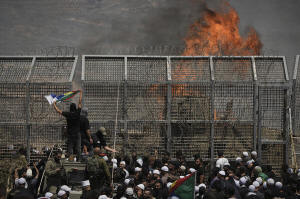Syrian government and Druze minority leaders announce a new ceasefire
[July 17, 2025]
By ABDELRAHMAN SHAHEEN and KAREEM CHEHAYEB
DAMASCUS, Syria (AP) — Syrian government officials and leaders in the
Druze religious minority announced a renewed ceasefire Wednesday after
days of clashes that have threatened to unravel the country’s postwar
political transition and drawn military intervention by powerful
neighbor Israel.
Convoys of government forces began withdrawing from the city of Sweida,
but it was not immediately clear if the agreement, announced by Syria's
Interior Ministry and in a video message by a Druze religious leader,
would hold. A previous ceasefire announced Tuesday quickly fell apart,
and a prominent Druze leader, Sheikh Hikmat Al-Hijri, disavowed the new
agreement.
Israeli strikes continued after the ceasefire announcement.
Rare Israeli airstrikes in the heart of Damascus
The announcement came after Israel launched rare airstrikes in the heart
of Damascus, an escalation in a campaign that it said was intended to
defend the Druze and push Islamic militants away from its border. The
Druze form a substantial community in Israel as well as in Syria and are
seen in Israel as a loyal minority, often serving in the military.
The escalation in Syria began with tit-for-tat kidnappings and attacks
between local Sunni Bedouin tribes and Druze armed factions in the
southern province of Sweida. Government forces that intervened to
restore order clashed with the Druze militias, but also in some cases
attacked civilians.
The violence appeared to be the most serious threat yet to efforts by
Syria’s new rulers to consolidate control of the country after a rebel
offensive led by Islamist insurgent groups ousted longtime despotic
leader Bashar Assad in December, ending a nearly 14-year civil war.

Interim President Ahmad al-Sharaa, in footage on state television early
Thursday, called the Druze an integral part of Syria and denounced
Israel's actions as sowing division.
“We affirm that protecting your rights and freedoms is among our top
priorities,” he said, specifically addressing Druze people in Syria. "We
reject any attempt — foreign or domestic — to sow division within our
ranks. We are all partners in this land, and we will not allow any group
to distort the beautiful image that Syria and its diversity represent.”
He said Israel sought to break Syrian unity and turn the country into a
theater of chaos but that Syrians were rejecting division.
He said Syrians did not fear renewed war but sought the path of Syrian
interest over destruction. “We assigned local factions and Druze
spiritual leaders the responsibility of maintaining security in (Sweida),
recognizing the gravity of the situation and the need to avoid dragging
the country" into a new war, he said.
Syria's new, primarily Sunni Muslim, authorities have faced suspicion
from religious and ethnic minorities, especially after clashes between
government forces and pro-Assad armed groups in March spiraled into
sectarian revenge attacks. Hundreds of civilians from the Alawite
religious minority, to which Assad belongs, were killed.
No official casualty figures have been released for the latest fighting
since Monday, when the Interior Ministry said 30 people had been killed.
The U.K.-based war monitor Syrian Observatory for Human Rights said more
than 300 people had been killed as of Wednesday morning, including four
children, eight women and 165 soldiers and security forces.
Israel threatens further escalation
Israel has launched dozens of strikes targeting government troops and
convoys heading into Sweida, and on Wednesday struck the Syrian Defense
Ministry headquarters next to a busy square in Damascus that became a
gathering point after Assad's fall.
That strike killed three people and injured 34, Syrian officials said.
Another Israeli strike hit near the presidential palace in the hills
outside Damascus.
Israeli Defense Minister Israel Katz said after the initial Damascus
airstrike in a post on X that the “painful blows have begun.”

Israel has taken an aggressive stance toward Syria’s new leaders, saying
it doesn’t want Islamist militants near its borders. Israeli forces have
seized a U.N.-patrolled buffer zone on Syrian territory along the border
with the Golan Heights and launched hundreds of airstrikes on military
sites in Syria.
Kats said in a statement that the Israeli army “will continue to attack
regime forces until they withdraw from the area — and will also soon
raise the bar of responses against the regime if the message is not
understood.”
[to top of second column]
|

Druze from Syria and Israel protest on the Israeli-Syrian border, in
Majdal Shams in the Israeli-controlled Golan Heights, Wednesday,
July 16, 2025, amid the ongoing clashes between Syrian government
forces and Druze armed groups in the southern Syrian city of Sweida.
(AP Photo/Leo Correa)

An Israeli military official who spoke on condition of anonymity in
line with regulations said the army was preparing for a “multitude
of scenarios" and that a brigade, normally comprising thousands of
soldiers, was being pulled out of Gaza and sent to the Golan
Heights.
Syria’s Defense Ministry had earlier blamed militias in the
Druze-majority area of Sweida for violating the ceasefire agreement
reached Tuesday.
Druze fear for the lives of relatives in Sweida
Reports of attacks on civilians continued to surface, and Druze with
family members in the conflict zone searched desperately for
information about their fate.
In Jaramana, near the Syrian capital, Evelyn Azzam, 20, said she
feared that her husband, Robert Kiwan, 23, was dead. The newlyweds
live in the Damascus suburb, but Kiwan commuted to Sweida for work
and was trapped there when the clashes erupted.
Azzam said she was on the phone with Kiwan when security forces
questioned him and a colleague about whether they were affiliated
with Druze militias. When her husband's colleague raised his voice,
she heard a gunshot. Kiwan was then shot while trying to appeal.
“They shot my husband in the hip, from what I could gather,” she
said, struggling to hold back tears. “The ambulance took him to the
hospital. Since then, we have no idea what has happened.”
A Syrian Druze from Sweida living in the United Arab Emirates said
her mother, father and sister were hiding in a basement in their
home near the hospital, where they could hear the sound of shelling
and bullets outside. She spoke on condition of anonymity out of fear
her family might be targeted.
She had struggled to reach them, but when she did, she said, “I
heard them cry. I have never heard them this way before."
Another Druze woman living in the UAE with family members in Sweida,
who also spoke on condition of anonymity, said a cousin told her
that a house where their relatives lived had been burned down with
everyone inside it.
It reminded her of when the Islamic State extremist group attacked
Sweida in 2018, she said. Her uncle was among many civilians there
who had taken up arms to fight back while Assad’s forces stood
aside. He was killed in the fighting.

“It’s the same right now," she told The Associated Press. The Druze
fighters, she said, are “just people who are protecting their
province and their families.”
The Druze religious sect began as a 10th-century offshoot of
Ismailism, a branch of Shiite Islam. More than half of the roughly 1
million Druze worldwide live in Syria. Most of the other Druze live
in Lebanon and Israel, including in the Golan Heights, which Israel
captured from Syria in the 1967 Mideast War and annexed in 1981.
Reports of killings and looting in Druze areas
Videos surfaced on social media of government-affiliated fighters
forcibly shaving the mustaches of Druze sheikhs and stepping on
Druze flags and pictures of religious clerics. Other videos showed
Druze fighters beating captured government forces and posing by
their bodies. AP reporters in the area saw burned and looted houses.
The observatory said at least 27 people were killed in “field
executions.”
Druze in the Golan gathered along the border fence to protest the
violence against Druze in Syria.
U.S. Secretary of State Marco Rubio said Wednesday that Washington
is “very concerned” about the Israel-Syria violence, which he
attributed to a “misunderstanding,” and has been in touch with both
sides in an effort to restore calm.
___
Chehayeb reported from Beirut. Associated Press writers Tia
Goldenberg in Tel Aviv, Israel, Abby Sewell in Beirut, and Matthew
Lee in Washington contributed to this report.
All contents © copyright 2025 Associated Press. All rights reserved |